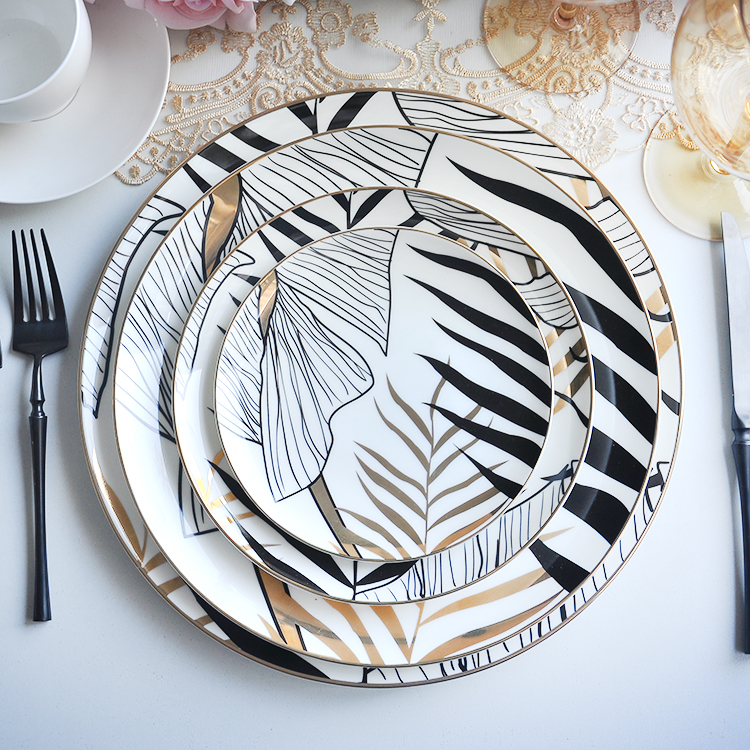Bone china, as a cultural artwork, was invented
by the British. When making pottery, the ashes of herbivores such as cows and
sheep are added to make it appear the natural milky white color of natural bone
meal. What is the difference between the two traditional ceramics? The
difference? The bone china dinnerware supplier will answer for everyone:

Bone china is made by adding about 30%
herbivore bone meal (best bone meal) to the ceramic raw materials, and then
undergoing three firing processes of high-temperature biscuit firing,
low-temperature glaze firing, and decal firing. Because it adopts over-firing,
that is, biscuit firing and then glaze firing after polishing the blank, the
bone china has good regularity. The addition of bone ashes increases the
hardness and light transmittance of bone china, and its strength is twice that
of daily-use porcelain; the bone ashes are combined with a unique firing
process to eliminate porcelain clay impurities, making bone china delicate,
transparent and white (visually unique Clean feeling), light weight, few flaws,
thinner than ordinary porcelain. Of course, the higher the proportion of bone
powder, the lower the proportion of clay in the raw material, the lower the
viscosity of the porcelain body, the easier it is to burn during the production
process, and the molding requires higher technology. Therefore, high-quality
bone china (bone powder content 45% and more Above) is more precious.
The previous introduction is about the
difference between bone china and ceramics:
1. Different raw materials
The raw materials of porcelain are kaolin,
porcelain stone, etc., and bone china is bone meal, clay, etc.
2. Permeability
As mentioned above, the raw material bone
powder of bone china makes its permeability very good. Porcelain generally does
not have good permeability. Thin porcelain such as Linglong porcelain can
transmit light.
3. Firing process
Bone china is a low-temperature porcelain
with a maximum firing temperature of 1220 degrees Celsius. It is made after
over-firing. The firing temperature of Chinese porcelain is relatively high
because the pigments of the floral decoration are caused by heavy metals and
require high temperatures to develop.
The raw material bone meal of porcelain
makes its permeability very good
4. Flower decoration craft
Bone china can only be decals. Bone china
is overglaze. As for porcelain, it can be hand-painted, semi-hand-painted,
decals, etc. Porcelain decals can be over-glazed or under-glazed. The
underglaze decals are transferred to the ceramic body, and of course the
overglaze decals are transferred to the glaze. There are differences in the
coloring of the same hand-painted pattern, the decal magnifying glass can see
the network grid pattern, of course, you can also check whether the corner
position pattern has gaps, overlaps, etc.
5. Unit of measurement
The measurement unit of bone china is
"head" and the measurement unit of porcelain is "piece".
"Head" does not refer to the number of bone powders of animals used
in bone china, but refers to the quantity of the whole set of bone china;
"piece" is a comprehensive measurement unit used for cutting tools,
which facilitates the formulation of wages, prices, production quotas, etc. It
not only represents the unit of measurement for the specifications of cut
porcelain, but also represents the difficulty of making porcelain.
6. Thermal insulation
Bone china has a better heat preservation
effect and can retain the taste of tea or coffee for a longer time.
7. Water absorption
Bone china has a lower water absorption
rate than porcelain, so it is easier to clean. Generally, it can be washed with
warm water, which gives people a unique sense of cleanliness.
8. Appearance characteristics
Bone China, the milky white of natural bone
meal, with a little yellow in the white, similar to milk powder, the white of
porcelain will be blue and white, bright white, etc. Bone china is relatively
thin, with a thickness of only 2 to 2.5 mm, which is much lighter than
porcelain.
The characteristics of high-quality bone
china are thin, light, transparent, milky white, and the sound of tapping is as
clear as a bell, and the echo is long-lasting; good china is characterized by
smooth and flawless surface and crisp sound; bone china is currently the only
recognized high-end china Kind.